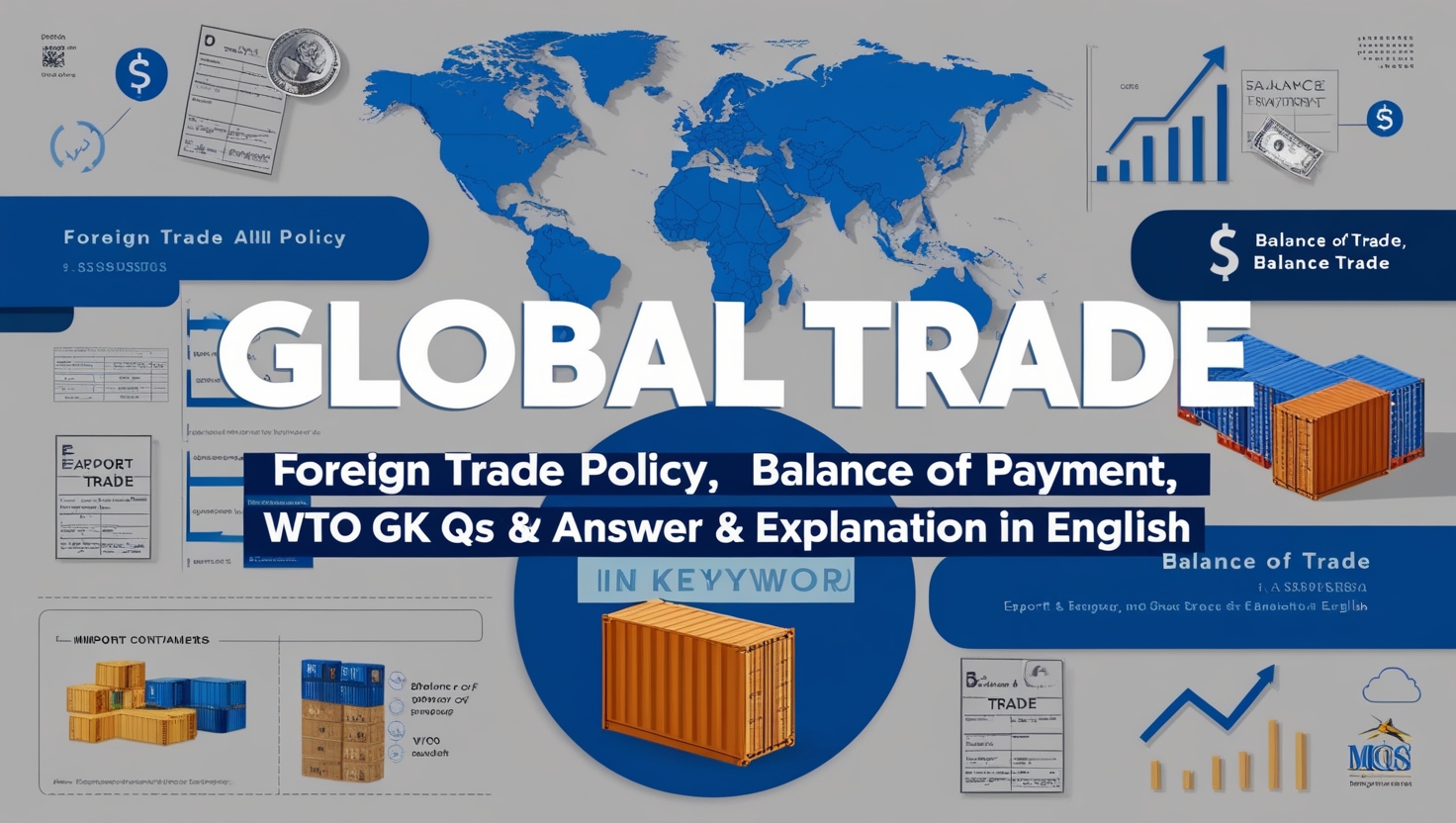
Foreign Trade Policy, Balance of Trade, Balance of Payment, WTO GK MCQs With Answer & Explanation in English is an essential resource for anyone preparing for competitive exams or seeking to enhance their understanding of international trade and economic policies. This article provides a comprehensive collection of multiple-choice questions (MCQs) covering key concepts of foreign trade policies, the balance of trade, balance of payments, and the World Trade Organization (WTO).
Each question is accompanied by detailed answers and explanations, ensuring a deeper grasp of these critical topics for effective preparation.
1. Export of which of the following is an Invisible Export?
- Services
- Prohibited goods
- Unrecorded goods
- Goods through smuggling
Show Answer
Answer: Services
An invisible export refers to the export of services or intangible goods that do not have a tangible physical presence. These include services such as expertise, software, insurance underwriting, consulting, financial services, and more. While tangible goods like machinery or electronics are physically transported across borders, invisible exports represent economic activities related to knowledge and expertise, contributing significantly to a country’s economy.
2. Which of the following is NOT related to the World Trade Organization (WTO)?
- Multi Fiber Agreement
- General Agreement on Trade and Services
- Multilateral Agreement on Investment
- Agreement on Agriculture
Show Answer
Answer: Multilateral Agreement on Investment
The Multilateral Agreement on Investment is not related to the World Trade Organization (WTO). The MAI was a proposed international treaty that aimed to promote and protect foreign investment by multinational corporations. It was negotiated independently of the WTO but faced criticism and opposition and was eventually abandoned.
3. If there is an increase in the external commercial borrowings in India, what will be the impact on the external debt of the country?
- Increase
- Decrease
- Remain unaffected
- Either increase or decrease
Show Answer
Answer: Increase
An increase in external commercial borrowings (ECB) does lead to an increase in the external debt of a country. ECB represents the amount of money borrowed from foreign sources for commercial activities in India. It adds to the overall external debt burden of the country and should be managed prudently.
4. Which of the following commodities are directly affected by fluctuations in international rates of crude oil?
- Edible Oils
- Cereals
- Gold & Silver
- Consumer nondurable
Show Answer
Answer: Gold & Silver
Gold and silver prices can have a direct relationship with fluctuations in international crude oil prices. When international crude oil prices rise, the demand for the U.S. dollar (USD) increases, leading to a depreciation of the Indian rupee (INR). A weaker rupee makes the import of gold and silver more expensive, causing their prices to rise in the domestic market.
5. In which of the following WTO ministerial conferences, India formed a core group on Non Agricultural Market Access (NAMA) with other developing countries such as Argentina, Brazil, Indonesia, South Africa, Philippines, etc.?
- Cancun
- Singapore
- Hong Kong
- Doha
Show Answer
Answer: Doha
India formed a core group on Non-Agricultural Market Access (NAMA) with other developing countries during the Doha Ministerial Conference in 2001. NAMA negotiations aim to address trade barriers and tariffs related to non-agricultural products, such as industrial goods and textiles.
6. For which of the commodities is the unit bpd (barrel per day) used in international trade?
- Meat & Livestock
- Precious Metals
- Industrial Metals
- Crude oil
Show Answer
Answer: Crude oil
In international trade, a barrel per day (bpd) is used to measure the amount of crude oil produced or consumed by an entity in one day. One barrel is equivalent to 42 gallons, and it serves as a standard unit for measuring oil production and consumption.
7. With which of the following is WIPO (World Intellectual Property Organization) related to?
- Investment
- Intellectual Property
- International trade
- Indigenous people
Show Answer
Answer: Intellectual Property
WIPO is related to intellectual property and deals with issues related to patents, copyrights, trademarks, and other forms of intellectual property rights. It plays a significant role in setting international standards and providing protection for intellectual property at a global level.
8. In the context of currency management in India, the responsibility for coinage vests with which of the following?
- Government of India
- Reserve Bank of India
- Currency Chests
- Commercial Banks
Show Answer
Answer: Government of India
The responsibility for coinage in India vests with the Government of India as per the Coinage Act, 1906. The government is responsible for designing, minting, and regulating coins in the country.
9. Countervailing duty is imposed on which of the following imported goods?
- Exported goods
- Imported goods
- Imported goods on which import subsidy is applicable
- Exported goods on which export subsidy is applicable
Show Answer
Answer: Imported goods on which import subsidy is applicable
Countervailing duty is imposed on imported goods on which an import subsidy is applicable in the exporting country. It is levied to counter the advantage gained by such subsidized imports in the domestic market, ensuring fair competition.
10. Which among the following in India releases data on balance of payments (BOP) from time to time?
- Central Statistical Organization
- Ministry of Finance, Government of India
- Ministry of Commerce & Trade, Government of India
- Reserve Bank of India
Show Answer
Answer: Reserve Bank of India
The Reserve Bank of India (RBI) releases data on balance of payments (BOP) from time to time. BOP is a record of all economic transactions made between residents of a country and the rest of the world over a specified period. It provides insights into a country’s economic interactions with other nations.








Leave a Reply